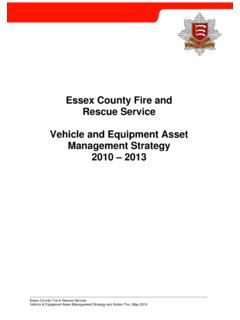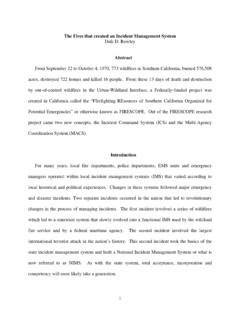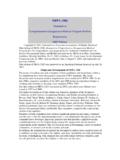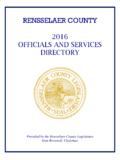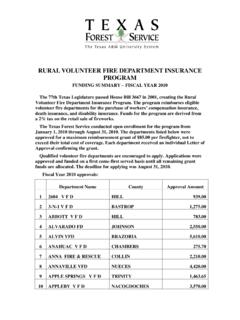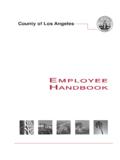Transcription of The New Jersey Uniform Fire Code - Jackson Fire …
1 NEW Jersey Uniform fire code Application of the New Jersey Uniform fire code (NJUFC) is one of the many and varied services provided by most fire departments in the State of New Jersey . More importantly, it is a provision of service to which the consumer public or general citizenry is entitled. In order to better understand the NJUFC, a review of the events leading up to its enactment is imperative. The State of New Jersey , along with the rest of the Nation, experienced an exceptionally large number of fires and fire deaths during the 1960 s, 1970 s and into the 1980 s.
2 In addition to significant fires and fire deaths in New Jersey s larger cities, two major fires with multiple fire deaths occurred in municipalities within Monmouth County. The Brinley Inn fire in Bradley Beach in 1980 resulted in the deaths of 24 people and the Beachview Rest Home fire in Keansburg in 1981 resulted in the deaths of 31 people. These tragedies were a major impetus, which led to enactment of the Uniform fire Safety Act on November 12, 1983. State Senator John P. Caufield, who was also Director of the Newark fire department at the time, was one of the primary proponents of this legislation.
3 The purpose of the Uniform fire Safety Act was the creation of a fire Safety Commission whose responsibility was to ensure that all areas of the State are protected by a Uniform , minimum fire safety code so that the lives and property of the State s citizens are guarded against the hazards presented by fire . Pursuant to enactment of the Uniform fire Safety Act and the efforts of the fire Safety Commission, the New Jersey Uniform fire code was adopted on February 19, 1985. The State of New Jersey department of Community Affairs, Division of fire Safety oversees its application.
4 The NJUFC, in addition to regulating fire safety inspections throughout the State, also governs mandatory requirements for firefighter training, firefighter instruction, firefighting equipment, fire investigations, the management of fire and related emergency incidents, etc. With regard to fire safety, the NJUFC is essentially divided into two separate areas. The fire Prevention code , which was enacted as part of the NJUFC on February 19, 1985, and the fire Safety code , which was enacted as an addition, to the NJUFC on June 16, 1986. The fire Prevention code regulates the proper maintenance of existing fire protection features of an occupancy; whereas, the fire Safety code addresses retrofit requirements in which modifications must be made to address the lack of fire safety in an occupancy.
5 The most recent example of a retrofit requirement is Governor Whitman s signing into law on July 5, 2000 the Sprinkler Bill which requires all public and private colleges and boarding schools to install sprinklers. This law was enacted in response to the unfortunate and tragic deaths of Seton Hall University students as a result of a fire in their dormitory on January 19, 2000. Some other aspects of the NJUFC are as follows: Certificates of Smoke Detector and Carbon Monoxide Alarm Compliance (CSDCMAC) prior to the sale, lease or change of occupancy of a residential dwelling unit, a CSDCMAC must be obtained.
6 This certification attests to the fact that working smoke detectors and carbon monoxide alarms are properly located in residences. Windowless Basements requires firefighter access openings, of specific dimensions, to provide entry into a below grade area; if an access opening is not of the required dimension, a fire detection system or fire suppression system is required. This section of the NJUFC was enacted due to the death of a New Jersey Firefighter in a basement fire lacking an appropriate access opening as well as a fire detection system or a fire suppression system.
7 Truss Placards requires structures of truss construction to be identified as such by having an emblem of a bright, reflective color and in the shape of a triangle affixed to them. This section of the NJUFC was enacted to alert firefighters to the truss construction of structures after the deaths of five New Jersey Firefighters in the collapse of a truss constructed structure involved in fire . Amusement Buildings all structures that are designed to disorient, reduce vision, present barriers or impede the flow of traffic (such as haunted houses or houses of terror) are to be equipped with fire detection and suppression systems as well as various other fire safety provisions.
8 Once again, this section of the NJUFC was enacted after a tragedy, the deaths of several teenagers in a haunted house in a New Jersey amusement park. fire Safety Permits (FSP s) a FSP is required in order to maintain, store or handle materials, or to conduct processes which produce conditions hazardous to life or property, or to install equipment used in connection with such activities. Some examples for which a FSP is required include the use of a torch, welding or cutting operations, discharging of fireworks, fumigation, bonfires, etc. General fire Safety pertains to a multitude of issues, which are specifically addressed within the NJUFC.
9 This includes maintenance of fire detection and suppression systems, fire extinguishers, means of egresses, storage and housekeeping, electrical safety, heating appliance safety, cooking appliance safety, etc. The NJUFC is extremely detailed and as a result, it requires competent fire inspectors to interpret and apply. Prior to becoming a fire inspector, an individual must become certified as a fire inspector and in order to become certified, appropriate coursework must be satisfactorily completed and a passing grade on an exam attained. In addition, once certified, the fire inspector must complete required continuing education training on an annual basis.
10 Furthermore, if a fire inspector knowingly fails to perform his duty as imposed by the NJUFC, he or she can be held criminally liable. In conclusion, the citizenry of the State of New Jersey is indeed fortunate, that fire safety is regarded as such a serious matter and therefore, that we are all entitled to a minimum, acceptable level of fire safety as well.
